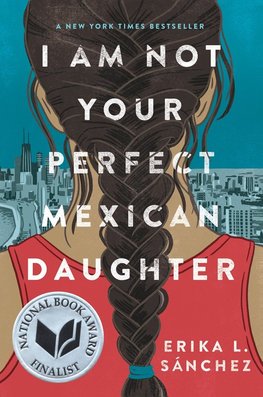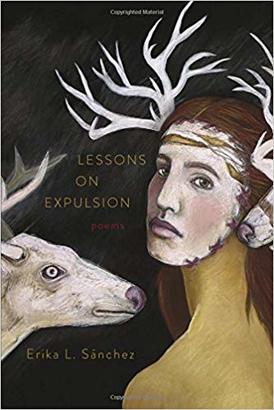Interview with New York Times Bestselling Author Erika L. Sánchez
Erika L. Sánchez is the daughter of Mexican immigrants. A poet, essayist, and fiction writer, she is the author of a young adult novel, I Am Not Your Perfect Mexican Daughter (Knopf Books for Young Readers, 2017), a National Book Award Finalist, and the poetry collection, Lessons on Expulsion (Graywolf, 2017), a finalist of the Pen America Open Book Award. Her nonfiction has been published in Al Jazeera, Cosmopolitan, ESPN.com, the Guardian, NBC News, Rolling Stone, Salon, and elsewhere. She has received a CantoMundo Fellowship, a Discovery/Boston Review Poetry Prize, a Fulbright Scholarship to Madrid, Spain, and a Ruth Lilly and Dorothy Sargent Rosenberg Poetry Fellowship from the Poetry Foundation. She is a 2017-2019 Princeton Arts Fellow.
PRISCILLA CELINA SUAREZ: Erika, we are so appreciative of you taking time for this interview with Latino Book Review. Welcome to our family!
ERIKA L. SÁNCHEZ: Thank you so much for the invitation. I’m happy to do it.
SUAREZ: Your young adult novel, I Am Not Your Perfect Mexican Daughter, was recently selected as a 2018 Teens’ Top Ten by the Young Adult Library Services Association. You are one of a few Latinos nominated for this list and it is a milestone for our community to have your work announced as a winner. What did you envision when first working on this novel? With the embrace you have received from teen readers, do you see yourself writing more YA literature in the future?
ERIKA L. SÁNCHEZ: Thank you so much for the invitation. I’m happy to do it.
SUAREZ: Your young adult novel, I Am Not Your Perfect Mexican Daughter, was recently selected as a 2018 Teens’ Top Ten by the Young Adult Library Services Association. You are one of a few Latinos nominated for this list and it is a milestone for our community to have your work announced as a winner. What did you envision when first working on this novel? With the embrace you have received from teen readers, do you see yourself writing more YA literature in the future?
|
SÁNCHEZ: I had so many high hopes for this book. My primary goal was to have it reach as many young people as possible. I knew that it would speak to girls of color in particular, especially immigrant daughters. This is a common story that isn’t a part of mainstream literature or media. I want to help change this. The reception of my novel has been unreal. Writers always want their books to do well, of course, but there is no way to predict what will happen. I was completely taken aback when it made the NYT bestsellers list the week it came out. I was also nominated for the National Book Award before it was officially published, which was a complete surprise. I’m incredibly lucky to have so much support. I do want to write more YA literature, but that’s not something I’m working on now. I feel that books choose me when they’re ready. I can’t force them into being. I’m currently writing a collection of personal essays.
|
SUAREZ: Being a pocha myself, I was able to relate to the characters in your novel. Do the characters reflect people you know? Do you have a favorite character?
SÁNCHEZ: The characters are fictional, but I did draw upon my experiences. Some of them are amalgams of people I’ve known. Mr. Ingman, for instance, is a mashup of my most influential teachers. Lorena is probably my favorite character because she is so outrageous, so sure of who she is. I love that she’s unapologetic about her sexuality and always says what she means. I wish I would have had a friend like that in high school.
SUAREZ: For the Spanish Edition of I Am Not Your Perfect Mexican Daughter, did you work closely with the translator(s) of this book? Do you sometimes find yourself writing in Spanish?
SANCHEZ: I did not. I thought it was best left to the experts. Lol. I was also going through a lot at the time and was not really emotionally equipped to get involved. Although I’m fluent in Spanish, it’s not my strongest language because most of my education has been in English. I mostly find myself writing in Spanglish. I think and feel in both languages.
SUAREZ: As a daughter of immigrants, how does the conversation of language, culture, and borders take shape in your literature? Is it a topic that intentionally appears in your work?
SÁNCHEZ: I grew up always thinking about the border. My parents immigrated to the U.S. in 1978 with a coyote. Most of my family arrived in this country without documents. I heard many stories about the dangers on the border and the difficulty in obtaining “papeles.” I don’t know if I would say the topic is intentional, since it’s something that is deeply ingrained in who I am. It manifests itself in everything I do. I think, for the most part, borders are bullshit. I have trouble accepting the notion that governments have the right to tell people where they can and can’t go. I’m always suspicious of binaries, whether physical or metaphorical.
SÁNCHEZ: The characters are fictional, but I did draw upon my experiences. Some of them are amalgams of people I’ve known. Mr. Ingman, for instance, is a mashup of my most influential teachers. Lorena is probably my favorite character because she is so outrageous, so sure of who she is. I love that she’s unapologetic about her sexuality and always says what she means. I wish I would have had a friend like that in high school.
SUAREZ: For the Spanish Edition of I Am Not Your Perfect Mexican Daughter, did you work closely with the translator(s) of this book? Do you sometimes find yourself writing in Spanish?
SANCHEZ: I did not. I thought it was best left to the experts. Lol. I was also going through a lot at the time and was not really emotionally equipped to get involved. Although I’m fluent in Spanish, it’s not my strongest language because most of my education has been in English. I mostly find myself writing in Spanglish. I think and feel in both languages.
SUAREZ: As a daughter of immigrants, how does the conversation of language, culture, and borders take shape in your literature? Is it a topic that intentionally appears in your work?
SÁNCHEZ: I grew up always thinking about the border. My parents immigrated to the U.S. in 1978 with a coyote. Most of my family arrived in this country without documents. I heard many stories about the dangers on the border and the difficulty in obtaining “papeles.” I don’t know if I would say the topic is intentional, since it’s something that is deeply ingrained in who I am. It manifests itself in everything I do. I think, for the most part, borders are bullshit. I have trouble accepting the notion that governments have the right to tell people where they can and can’t go. I’m always suspicious of binaries, whether physical or metaphorical.
|
SUAREZ: You also released your poetry collection, Lessons on Expulsion, the same year you published your novel. How did the writing process differ when preparing both manuscripts?
SÁNCHEZ: I’d been working on my poems since college, so the book was over a decade of work. The novel took abut about 5 years, from start to publication. The writing process for poetry and prose is significantly different for me. Poetry requires a lot of silence and contemplation. It can take me years to finish one poem. I’m incredibly meticulous. The novel was different in that I wrote some of it in a frenzy. There was a time I wrote obsessively for several weeks. It took over my life. But I suppose I still write prose like a poet because I printed out my first draft and rewrote the whole thing. I pay a lot of attention to diction, rhythm, and image, which is why a finished product takes forever. |
SUAREZ: How has being part of a writing community such as CantoMundo influenced your work? How is community important in your life as a writer?
SÁNCHEZ: CantoMundo has been really incredible. I’ve met so many wonderful Latinx writers since I became part of that community. There is a deep sense of solidarity and support that I’m really grateful for. Growing up I always felt lonely and misunderstood. I didn’t have many friends. Now as an adult, I feel like I’ve finally found my people.
SUAREZ: During your writing career, have you had any mentors?
SÁNCHEZ: Yes. And I owe them so much. I couldn’t have gotten this far without their guidance. Rigoberto Gónzalez and Eduardo Corral have been very supportive of my work and have given me so much valuable advice. Most recently I became friends with Sandra Cisneros, who has been a hero of mine for a long time. She helped me through a very difficult period in my life.
SUAREZ: As a published author, what has been your favorite experience to date? Do you have any advice for aspiring writers of color?
SÁNCHEZ: Build community. You won’t get very far without it. You have to support other writers. Read and promote as much as you can. Also, you have to come to terms with rejection. Not everyone is going to love your work, and that’s ok. You just have to keep going. No matter how accomplished you may be, you probably won’t escape it. Write because you love it, not for fame or recognition.
SUAREZ: What literature is currently on your reading list? Do you have any book recommendations for us?
SÁNCHEZ: Wow, where do I begin?
SÁNCHEZ: CantoMundo has been really incredible. I’ve met so many wonderful Latinx writers since I became part of that community. There is a deep sense of solidarity and support that I’m really grateful for. Growing up I always felt lonely and misunderstood. I didn’t have many friends. Now as an adult, I feel like I’ve finally found my people.
SUAREZ: During your writing career, have you had any mentors?
SÁNCHEZ: Yes. And I owe them so much. I couldn’t have gotten this far without their guidance. Rigoberto Gónzalez and Eduardo Corral have been very supportive of my work and have given me so much valuable advice. Most recently I became friends with Sandra Cisneros, who has been a hero of mine for a long time. She helped me through a very difficult period in my life.
SUAREZ: As a published author, what has been your favorite experience to date? Do you have any advice for aspiring writers of color?
SÁNCHEZ: Build community. You won’t get very far without it. You have to support other writers. Read and promote as much as you can. Also, you have to come to terms with rejection. Not everyone is going to love your work, and that’s ok. You just have to keep going. No matter how accomplished you may be, you probably won’t escape it. Write because you love it, not for fame or recognition.
SUAREZ: What literature is currently on your reading list? Do you have any book recommendations for us?
SÁNCHEZ: Wow, where do I begin?
|
Here are a few of my favorites at the moment:
We Are Never Meeting in Real Life by Samantha Irby We’re Going to Need More Wine by Gabrielle Union The Carrying by Ada Limón A Dream Called Home by Reyna Grande My Underground American Dream by Julissa Arce Sing, Unburied, Sing by Jesmyn Ward The Leavers by Lisa Ko SUAREZ: Erika, what a pleasure it is to have been able to chat with you! Thank you for your time! SÁNCHEZ: It was my pleasure. Thank you for supporting my work. |
Comment Box is loading comments...
|
|











